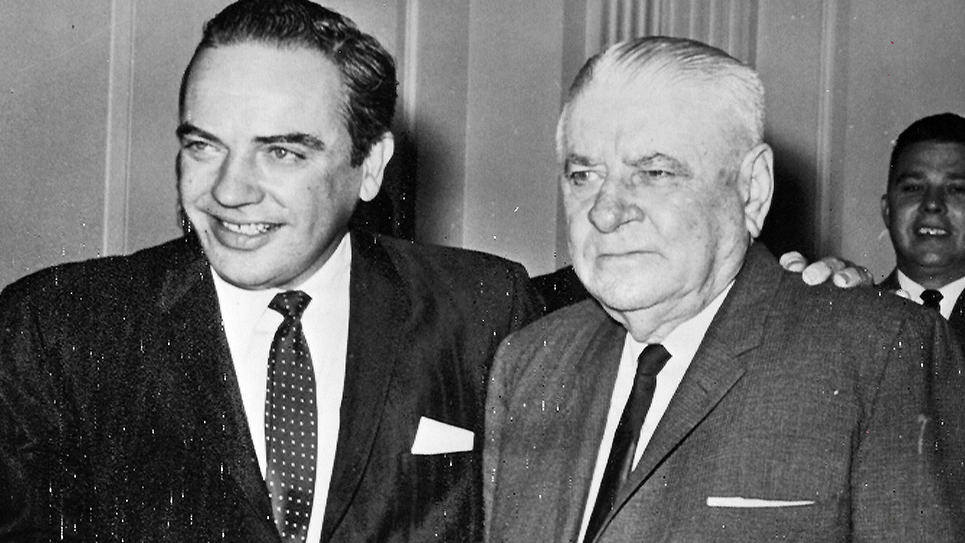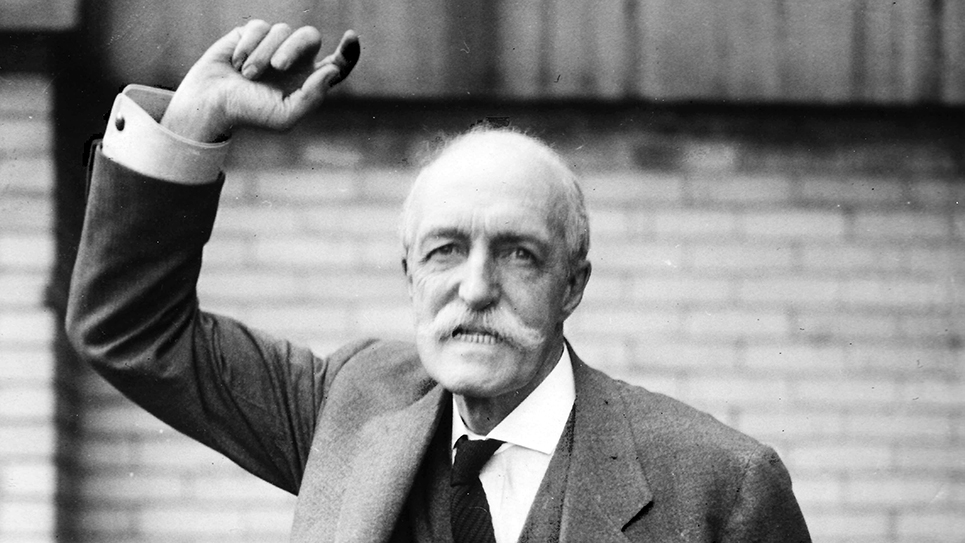Making a New Senator
By Ray Hill
Estes Kefauver, Tennessee’s senior United States senator, was having a bad day on Thursday, August 8, 1963. Kefauver was in the midst of the rough and tumble of debate while the Senate considered an appropriation bill for NASA. The Tennessean was hoping to attach an amendment to the NASA appropriation bill, which involved research done by the space agency. The Kefauver amendment required companies that reaped a profit from research subsidized by NASA to reimburse the agency for that research. Washington’s sweltering heat and oppressive humidity, as well as Senator Kefauver’s heavy smoking and fondness for drink, all contributed to his suffering a heart attack on the floor of the Senate that day. Fortunately, it was a mild attack, and the senator was rushed to Bethesda Naval Hospital. Doctors told Kefauver he needed surgery, but the senator put it off, as he expected his wife Nancy to return from out of town, and he wished to wait for her arrival. It was a fatal decision. Nancy Kefauver never saw her husband alive again. Kefauver’s aorta ruptured, and he died in his sleep around 3 a.m., just about the time Nancy Kefauver reached Washington, D.C.
When members of the U.S. House die or resign from office, the governor of his/her state calls a special election; when a member of the United States Senate dies or resigns from office, it falls to the governor to appoint someone to fill the vacancy and serve until the next regular election. Since Tennesseans began electing their own U.S. senators in 1916, not a single senator from the Class 1 seat has died in office or resigned. Of course, that is the same Senate seat held by Kenneth D. McKellar, who served continuously for 36 years. In the Class 2 seat, three senators died in office, while Cordell Hull resigned to accept appointment as President Roosevelt’s secretary of state.
Lawrence D. Tyson had died in office, and Governor Henry Horton first offered the appointment to former senator and newspaper titan Luke Lea, who turned it down. Governor Horton then offered the appointment to William E. Brock, the founder of one of the most successful candy-making businesses in the country. Brock was the grandfather and namesake of William E. Brock III; “Bill” Brock was elected to the United States Senate in 1970 as a Republican. The elder Brock was a Democrat and served from 1929-1931.
When Cordell Hull resigned his Senate seat in 1933, Governor Hill McAlister appointed Nathan L. Bachman, a former justice of the Tennessee State Supreme Court. Senator Bachman won the 1934 special election and 1936 regular election for a full six-year term. Bachman died in April of 1937, only three months into his six-year term. Governor Gordon Browning appointed George L. Berry, head of the Pressman’s Union, to fill the vacancy. Senator Berry ran hard for the remaining four years of the term in the 1938 special election, but he lost to Tom Stewart.
Estes Kefauver was the third popularly elected Tennessee senator to die in office. The governor of Tennessee in August of 1963 was Frank Clement. Governor Clement had flashed across Tennessee’s political horizon like a comet in 1952 when he won his first term at age 32, beating incumbent Gordon Browning. Clement was the first governor to serve a four-year term under the revisions to the State Constitution in 1954. Barred from running for a second consecutive four-year term, Clement thought of running for the United States Senate in 1958 against Senator Albert Gore but decided against it. In 1960, Clement had pondered making a bid for the Senate to oppose Kefauver and once again chose not to run. Frank Clement waited until 1962 when he sought a political comeback by running for governor once again. Clement won the Democratic primary and the general election.
Opponents quickly fanned rumors that Frank Clement would resign as governor to allow the lieutenant governor to become acting governor and appoint him to the senatorial vacancy. It had been done several times in other states across the country. Clement was acknowledged as a political animal and disliked private life. A seat in the U.S. Senate offered a six-year term and one could be reelected until death, retirement or being ousted by the people of Tennessee. As governor, Clement was confined to the single four-year term and then forced out of office to wait.
Virtually nobody in Tennessee believed Frank Clement would be satisfied to serve out his term as governor and quietly resume his law practice. The only options available to the governor were to resign, elevate James Bomar to the governorship, with the understanding the new chief executive would appoint him to the senatorial vacancy. A second option would be to appoint a caretaker who would hold the seat until the 1964 special election when the governor could run himself without the stigma of having appointed himself to the U.S. Senate. The third and last option was appointing a senator who would be a strong candidate to hold the seat in the 1964 election. Very few political observers believed Governor Clement would choose to hand off a seat in the United States Senate to someone who could run and win the next election.
Speculation immediately focused upon Herbert S. “Hub” Walters, a millionaire businessman who had long been active in Tennessee’s Democratic politics. Walters (for whom Walters State is named) was Tennessee’s Democratic National Committeeman and had been closely identified with the late Senator Kenneth McKellar and was known to be close to Governor Clement. Known as “Mr. Democrat” throughout Tennessee, few would dispute giving the honor of serving briefly in the United States Senate to someone of Hub Walters’ stature. Appointing Walters was also a signal that Clement intended to run for the Senate himself in the 1964 election, as the prospective senator was quite nearly 72 years old and his voice was diminished to just above a whisper due to successful surgery for throat cancer.
Frank Clement was too shrewd a politician not to realize that those governors who had engineered their own appointment to a vacant seat in the U.S. Senate usually fared poorly in the next election. Clement also knew many Tennesseans would look askance as he was less than eight months into a four-year term as governor. Such an arrangement had once before occurred in Tennessee history when Governor James B. Frazier, who had just been reelected, resigned to accept election by the Tennessee General Assembly to the U.S. Senate. Lieutenant Governor John I. Cox became governor. Cox lost the Democratic primary to challenger Malcolm Patterson, who decried the alleged deal, and Senator Frazier found he could not be reelected when his term expired.
Wild rumors ran rampant, and there was speculation that Governor Clement would appoint either his father, Robert, or his sister, Anna Belle, who served as the governor’s executive assistant. William L. “Dick” Barry, speaker of Tennessee’s House of Representatives, was also mentioned as a prospective appointee. Asked if he would accept the appointment, Hub Walters replied, “I am not a candidate for any public office. If the appointment were offered to me, I would be glad to accept, because I think I might be able to render some service to the State of Tennessee and the Democratic Party.” Walters reminded the reporter, “It would be a big sacrifice for me to have to walk off and leave my business.”
Aside from Joe L. Evins, the veteran congressman from Tennessee’s Fourth Congressional District, only Ross Bass seemed like a possibility as a senatorial prospect. Tennessee had two young freshmen legislators in its congressional delegation, but Dick Fulton and William Anderson were too new to be seriously considered, even were Governor Clement so inclined. Nor did Senator Kefauver’s widow, Nancy, seem to have any interest in being appointed, although the Nashville Tennessean insisted, she at least deserved the opportunity of an “offer” of the appointment from the governor.
Thousands of Tennesseans gathered in Kefauver’s hometown of Madisonville for the senator’s funeral. The delegation of U.S. senators attending included not only Albert Gore Sr., but also the newly elected senator from Massachusetts, Edward “Ted” Kennedy. Most notable Democrats and not a few Republicans traveled to Madisonville to pay their last respects to the man Lyndon Johnson once called, “The greatest campaigner of them all.” The mighty and the humble were mingled together and among those who attended was my grandmother, a native of Madisonville and a firm admirer of Estes Kefauver. My grandfather, a devout Republican, remained in the car.
As is always the case in such situations, the political class was talking politics before, during and after Senator Kefauver’s funeral. As the mahogany coffin of Senator Estes Kefauver was lowered into the soil of his family plot, rain trickled down and drenched the mourners who had come to say a final goodbye to their friend. The rain was democratic, trickling down the faces of Vice President Lyndon Johnson and my grandmother. One-time opponent Adlai Stevenson, who had twice won the Democratic presidential nomination against Estes Kefauver, sat with rain running down his bald head. The two had become friends when they were the Democratic nominees for president and vice president in 1956.
Newspapers were beginning to report Congressman Ross Bass was interested in running for the Senate in 1964. Friends of the congressman scoffed at the notion Bass wished to be appointed by Governor Clement. Those same friends told eager reporters the congressman was giving serious thought to making the race.
Hub Walters again let it be known he would accept the senatorial appointment, but only with the understanding he had the option of running himself in 1964.
Governor Clement, attending a governor’s conference in White Sulphur Springs, West Virginia, announced on August 19, 1963, he would make an announcement as to an appointee the following day in Nashville. Up to that point, Clement had adamantly refused to comment on the successor speculation which had swirled continuously in the newspaper since Senator Kefauver’s death.
Clement announced he was appointing Herbert S. Walters to the United States Senate. In his rich, resonating voice, Governor Clement told the packed room, “Senator Walters goes to Washington at a doubly critical time in our domestic and foreign affairs.”
As the cameras rolled and newsmen scribbled on their pads, the governor said, “It was obligatory that we send to Washington a man possessing the highest possible combination of qualifying background, foresight, fortitude, calmness in his evaluations and resoluteness in his actions.
“Tennessee and the nation have that man in Senator Walters,” Clement told the assembled press.
The Nashville Tennessean, bitterly opposed to Frank Clement and his administration, huffed in a petulant editorial, “Despite all the dawdling dramatics and the efforts to attract attention to himself the governor surprised nobody with the appointment” of Hub Walters. The Tennessean sniffed that Walters had been Clement’s “adviser and political step-father for more than a decade.” The Nashville daily newspaper had long ardently backed Senator Kefauver, and the crux of its editorial was that the editor didn’t much like the idea of Frank Clement running for the United States Senate.
Frank Clement did aspire to go to the U.S. Senate, and Hub Walters, 73 years old in 1964, was not a candidate. Congressman Ross Bass was as openly interested, if not more so than Clement, in his quest to win a Senate seat for himself. The death of Estes Kefauver had sparked a senatorial contest that would pit the charismatic and eloquent Governor Frank Clement against Bass, who inherited much of the support that had once belonged to Kefauver. In fact, the rivalry for Kefauver’s seat in the Senate would rage for two full years with Clement and Bass both seeking the Democratic nomination for the U.S. Senate in 1964 and once again in a bitter rematch in the 1966 primary.
What most Democrats did not anticipate was the growing Republican Party, which would play an outsized role in both the 1964 and 1966 elections.
© 2025 Ray Hill






